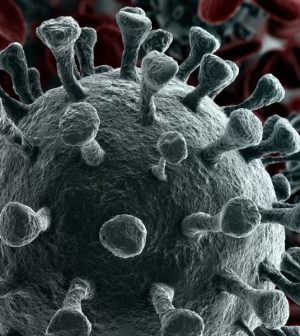- Recognizing the Signs of Hypothyroidism
- 10 Strategies to Overcome Insomnia
- Could Artificial Sweeteners Be Aging the Brain Faster?
- Techniques for Soothing Your Nervous System
- Does the Water in Your House Smell Funny? Here’s Why
- Can a Daily Dose of Apple Cider Vinegar Actually Aid Weight Loss?
- 6 Health Beverages That Can Actually Spike Your Blood Sugar
- Treatment Options for Social Anxiety Disorder
- Understanding the Connection Between Anxiety and Depression
- How Daily Prunes Can Influence Cholesterol and Inflammation
Prior Exposure to SARS Virus Provides Little Protection Against New Coronavirus

Previous exposure to other coronaviruses may enhance a person’s immune response to COVID-19 infection, but new research suggests that antibodies triggered by the SARS outbreak of 2003 provide only limited protection against the new coronavirus.
Antibodies are blood proteins made by the immune system to protect against infection, the Oregon Health & Science University (OHSU) researchers explained.
“Our finding has some important implications concerning immunity toward different strains of coronavirus infections, especially as these viruses continue to mutate,” said senior study author Fikadu Tafesse. He’s an assistant professor of molecular microbiology and immunology at OHSU School of Medicine, in Portland.
Mutations occur quickly — about one to two per month — so it’s not surprising that an antibody generated from a virus 18 years ago (such as severe acute respiratory syndrome, also known as SARS) provides little defense against the new coronavirus (SARS-CoV-2), the study authors said.
The findings suggest that more research is needed to assess how long COVID-19 vaccines are effective, Tafesse noted.
“I don’t think there is any one-size-fits-all vaccine, although the vaccines coming out now may break the momentum of the virus and end the pandemic, they may not be the end game,” Tafesse explained in a university news release.
Study lead author Timothy Bates, a fourth-year molecular microbiology and immunology graduate student at OHSU, said the findings weren’t that worrisome.
“Emerging mutant viruses may have some propensity to escape certain antibodies raised by previous infection or vaccine,” Bates said. But, “every individual has a different immune system that will make a unique repertoire of different antibodies that bind to different places on the virus, so the chance of any one SARS-CoV-2 variant escaping from all of them is quite low.”
The researchers also said their findings suggest that trying to detect a previous COVID-19 infection by analyzing antibodies in a person’s blood may be difficult due to the presence of antibodies generated by other types of coronaviruses, including those that cause the common cold.
The study was published online recently in the journal Cell Reports.
More information
The U.S. Centers for Disease Control and Prevention has more on COVID-19.
SOURCE: Oregon Health & Science University, news release, Jan. 25, 2021
Source: HealthDay
Copyright © 2026 HealthDay. All rights reserved.










